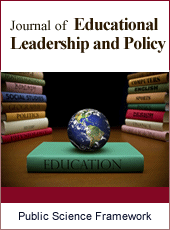Journal of Educational Leadership and Policy
Articles Information
Journal of Educational Leadership and Policy, Vol.2, No.3, Jun. 2017, Pub. Date: Sep. 18, 2017
Understanding the Twofold Face of Autonomous Learning: The Individual and the Collective Dimension
Pages: 14-23 Views: 2640 Downloads: 850
[01]
Leidy Marcela Chacón Vargas, Faculty of Education, Universidad Pedagógica y Tecnológica de Colombia, Tunja, Colombia.
This paper aims to present a study that fosters an alternative view of learners’ autonomy that considers both its individual and collective dimensions. The main objective of the study was, to understand how undergraduate students build themselves as autonomous learners when reconstructing meaningful learning experiences. Data were gathered through introspective diaries and semi structured interviews. The nine participants came from a private university; they were in fourth semester of Environmental Engineering and Psychology programs. They were also studying English II as part of their curriculum. Findings took the form of two main categories: learners as bricklayers investing in the reconstruction of their autonomous path and students making sense of significant others in their learning process.
Agency, Autonomous Learning, Capacities, Interdependence, Investment, Meaningful Experiences
[01]
Aguirre, J. & Ramos, B. (2009). Guidance in Reading Strategies: A First Step Towards Autonomous Learning in a Semi-Distance Education Program. PROFILE, 11, 41-56. Bogotá, Colombia.
[02]
Arfuch, L (2002) El espacio biográfico: Dilemas de la subjetividad contemporánea. Buenos Aires: Ed. Fondo de Cultura Económica.
[03]
Ariza, A. (2008). Unveiling students’ understanding of autonomy: Puzzling out a path to learning beyond the EFL classroom. PROFILE, 10, 47-73. Bogotá, Colombia.
[04]
Ariza, J. & Viáfara, J. (2009). Interweaving Autonomous Learning and Peer-tutoring in Coaching EFL Student-Teachers. PROFILE, 11, 85-104, Bogotá, Colombia.
[05]
Ballén, D. (2004). The Role of Blogs and Web Resources in Students’ Autonomous Learning Awareness. HOW, A Colombian Journal for Teachers of English, 21 (2), 10-30.
[06]
Bedoya, P. (2014). The Exercise of Learner Autonomy in a Virtual EFL Course in Colombia. HOW, 21, 82-102. Bogotá, Colombia.
[07]
Buendía, X. (2015). A Comparison of Chinese and Colombian University EFL Students Regarding Learner Autonomy. PROFILE, 17, 35-53. Bogotá, Colombia.
[08]
Cabrales, M. & Cáceres, J. (2013). The dynamics of curriculum and the evolution of autonomy in learning English as a Foreign Language. Ikala, 18, 45-60. Medellín, Colombia.
[09]
Cabrales, M. Cáceres, J. & Feria, I. (2010). La autonomía en el aprendizaje del inglés y su relación con los trabajos independientes asignados a los estudiantes. Ikala, 15, 119-150, Medellín, Colombia.
[10]
Cortés, M. & Sánchez, D. (2005). Profiles of Autonomy in the Field of Foreign Languages. PROFILE, 6. 133-140. Bogotá, Colombia.
[11]
Díaz, M. (2014). Developing Learner Autonomy Through Project Work in an ESP Class. HOW, A Colombian Journal for Teachers of English, 21 (2), 54-73.
[12]
Epstein, J. L. (2011). School, family, and community partnerships: Preparing educators and improving schools (2nd ed.). Philadelphia, PA: Westview Press.
[13]
Fandiño, Y. (2008). Action Research on Affective Factors and Language Learning Strategies: A Pathway to Critical Reflection and Teacher and Learner Autonomy. PROFILE, 10, 195-210. Bogotá, Colombia.
[14]
Glasser, B. & Strauss, A. (1967). The discovery of grounded theory. Hawthorne, NY: Aldine Publishing Company.
[15]
Grolnick, W. S., & Pomerantz, E. M. (2009). Issues and challenges in studying parental control: Toward a new conceptualization. Child Development Perspectives, 3, 165-170.
[16]
Lamb, T. E. (2011) Fragile identities: Exploring learner Identity, learner autonomy, and motivation through young learners’ voices. Canadian Journal of Applied Linguistics, 14 (2): 68-85.
[17]
Mercer, S. (2011a). Understanding learner agency as a complex dynamic system. System, 39 (4), 427–436.
[18]
Mercer, S. (2012b). The complexity of learner agency. Journal of Applied Language Studies, 6 (2), 41-59.
[19]
Mesa, P. & Frodden, C. (2004). Promoting Autonomy Through Project Work. Íkala, 9, 205-230, Medellín, Colombia.
[20]
Moll, L. (2000). Inspired by Vygotsky: Ethnographic experiments in education. In C. Lee & P. Smagorinsky (Eds.), Vygotskian perspectives on literacy research: Constructing meaning through collaborative inquiry, 256-268. Cambridge, UK: Cambridge University Press.
[21]
Norton, B. (2000a). Language and identity. In N. Hornberger & S. McKay (Eds). Sociolinguistics and language education. (pp. 349-369). Bristol, UK: Multilingual Matters.
[22]
Norton, B. (2010b). Language and identity. In N. Hornberger & S. McKay (Eds). Sociolinguistics and language education. (pp. 349-369). Bristol, UK: Multilingual Matters.
[23]
Nussbaum, M. (1990a). Cultivating humanity: A classical defense of reform in liberal education. Cambridge, MA: Harvard College
[24]
Nussbaum, M. (2000b), Women and human development: the capabilities approach, Cambridge: Cambridge University Press.
[25]
Perdomo, J. Rico, A. & Huepa. N. (2011). The Role that Socioaffective Practices Play in Third Graders’ Autonomous Learning. PROFILE, 13, 163-179. Bogotá, Colombia.
[26]
Pineda, D & Frodden, C. (2007). The Development of a Novice Teacher’s Autonomy in the Context of EFL in Colombia. PROFILE 9, 143-162. Bogotá, Colombia.
[27]
Tynjälä, P. (1999). Towards expert knowledge? A comparison between a constructivist and a traditional learning environment in the University. International Journal of Educational Research, 33 (5), 355-442.
[28]
Usma, J. & Frodden, C. (2003). Promoting teacher autonomy through innovation. Íkala, 8, 101-132, Medellín, Colombia.
[29]
Viáfara, J., & Ariza, A. (2008). Un modelo tutorial entre compañeros como apoyo al aprendizaje autónomo del inglés. Íkala, 13 (19), 173-209, Medellín, Colombia.
[30]
Vygotsky, L. S. (1978). Mind in Society. Cambridge, MA: Harvard University Press.
[31]
Wang, Q., Pomerantz, E. M., & Chen, H. (2007). The role of parents’ control in early adolescents’ psychological functioning: A longitudinal investigation in the United States and China. Child Development, 78, 1592-1610.

ISSN Print: Pending
ISSN Online: Pending
Current Issue:
Vol. 2, Issue 3, June Submit a Manuscript Join Editorial Board Join Reviewer Team
ISSN Online: Pending
Current Issue:
Vol. 2, Issue 3, June Submit a Manuscript Join Editorial Board Join Reviewer Team
| About This Journal |
| All Issues |
| Open Access |
| Indexing |
| Payment Information |
| Author Guidelines |
| Review Process |
| Publication Ethics |
| Editorial Board |
| Peer Reviewers |


